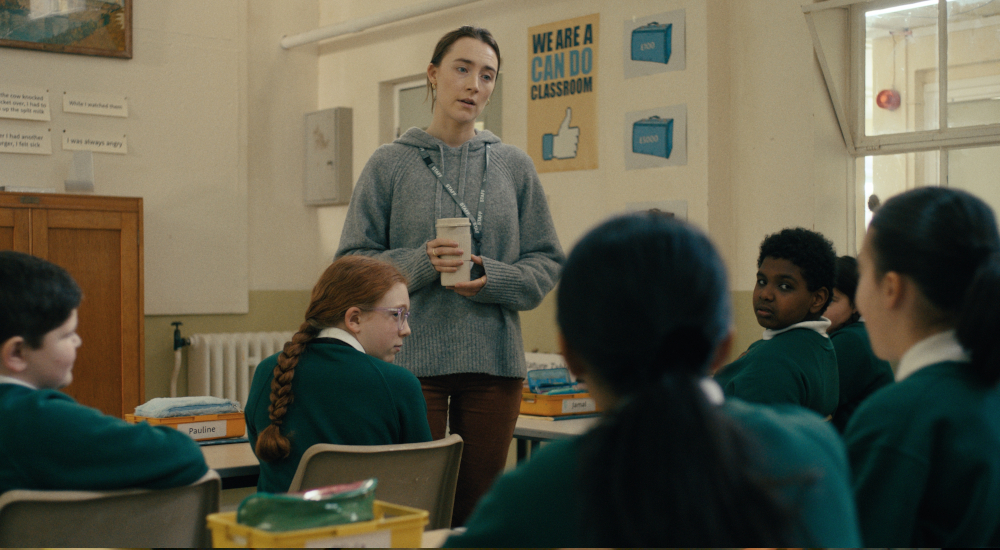"Where's Danny?"
Regardless of the country, primary educators are severely overworked and embarrassingly underpaid. Jonatan Etzler's Bad Apples explores that glaring reality, centering his film on a schoolteacher in England who is dealing with a living nightmare in her current classroom.
The film opens at an apple factory where a red and white shoe slowly makes its way along the conveyor belt, maneuvering through the stations as viewers wait for others to take notice. When it catches, the sirens sound and the factory workers scramble. Danny, a male student, mischievously looks down from a platform, admiring his work.
The factory marks the first in a series of blatant metaphors that underscore the dark, comedic tone of Etzler's sophomore feature. Adapted from the Swedish novel De Oonsade, the story is rich in its exploration of a system that has failed all parties, taking a deep look at the effects one devilish pupil can have on an entire classroom of students.
Academy Award nominee Saoirse Ronan stars as Maria, a primary teacher in England who longs for support as she attempts to rein in Danny, the school's most vile adolescent. But that support is nowhere to be found. Continuously scolded for her inability to control her class, Maria is at her wits' end as other students find themselves distracted by Danny's outbursts, their educational potential squandered by the constant interruption.
Etzler spends a significant portion of the first act building the viewer's frustration and annoyance with the story's primary villain. Danny, for lack of a more subtle term, is an ass. His attitude and demeanor scream for attention as his absent father uses the school system as a babysitting service, forgoing responsibility or awareness of his son's volatile behavior.
The move, while necessary, paints a dark picture of our troubled pupil. And although the extended gloom intends to curtail the viewer's moral expectations, it creates a chaotic and uncomfortable environment that momentarily overshadows the story's central message.
After a violent act against a fellow student leads to a suspension, a string of events results in an off-campus scuffle between Maria and her toxic student. Without a plan or a sense of direction, she acts on impulse, isolating Danny in her basement. As he screams for his release, banging his fist on the wooden door, she keeps the bolt fastened, fleeing to her car for peace.
The scenes that follow are both shocking and absurd. Although the story's large-scale outline has been explored before, I don't recall a time when it was presented within the confines of a teacher-student relationship. The angle proves imperative to the film's tonal success, as Etzler takes an often-feeling secure environment and twists it into a proverbial knot of moral ambiguity and doubt.
Ronan is downright brilliant as Maria. Passive and non-confrontational, she struggles to grasp the moment as Danny dominates her day-to-day life, eroding her confidence as she must constantly work to regain control of the situation. It is painful to bear witness. But even during the early stages, Ronan gives us a plethora of emotions, showcasing an abundance of range as she navigates the dark comedy with flawless precision, blending comedy and drama to create an authentic character who is tired, frustrated, and, simply put, out of options.
Newcomer Eddie Waller goes toe to toe with his seasoned costar, embodying the terrible Danny with effortless ease. And while his character proves easy to disassociate from, Waller brings a vulnerability to the role that, at times, allows for a degree of sympathy. That balance counters Maria's, giving the yin-yang dynamic an effective pulse that lasts until the final frame.
That said, Bad Apples, overflowing metaphors notwithstanding, is not a complete triumph. A prime example of a work where the individual parts outshine the collective effort, Etzler struggles to make everything come together seamlessly. And as the film works relentlessly to be both funny and stressful, it ultimately creates an overextended version of reality that is often overdone. The movie isn't bad; I just wanted it to be more concise and contain a more proper conclusion.

